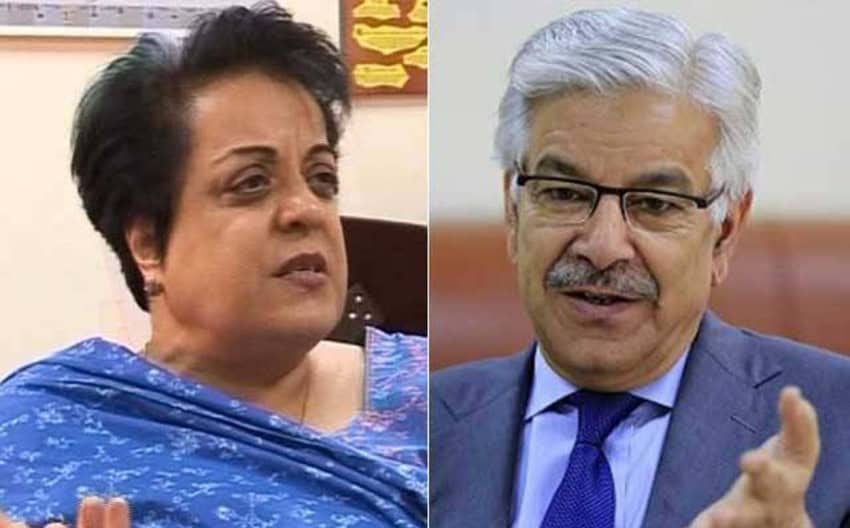After walking out of Parliament in protest of Khawaja Asif’s disparaging remarks, Shireen Mazari has made the unexpected move of referring the matter to the judiciary.
This move is unprecedented considering the fact that never before has a speech on the floor of the national assembly been referred to the Federal Ombudsman for Harassment of Women in the Workplace.
However, it is not the first time Khawaja Asif has said something controversial in parliament. Earlier, the veteran PML-N politician was criticized for speaking out against the defense budget on the floor of the parliament during the Musharraf regime.
While his speech against the military would not have been tolerated in recent times, Asif was spared his blushes due to the dismal performance of the government under Musharraf at the time. Almost exactly a decade later, Khawaja Asif, who now handles two important federal ministries, has landed himself in a similar situation by offending one of the most outspoken critics of the PML-N government in recent times.
After finding Asif’s apology, which was not even addressed to her, inadequate, Mazari has also filed a suit of defamation, which is supported by article 14 of the constitution of Pakistan (that safeguards the dignity of citizens). Unfortunately, her case is significantly weakened by the presence of article 66 of the constitution which provides freedom of speech to all members speaking the floor of the national assembly. The limitations on this right are significantly less than those on the speech of the average citizen (as per article 19) and therefore, there are very few things that cannot be said in the national assembly.
This position is further supported by article 69 which limits the judiciary from calling into question the validity of any proceedings in parliament, leaving most matters (with the exception of contempt of court) to be dealt with by the speaker.
This is not the first time that a member of the PTI has taken offense to the proceedings of parliament, considering the attempt made in 2014 to disqualify Nawaz Sharif from the post of Prime Minister. The thrust of the argument in that case was that the Prime Minister did not fulfill the requirement of truthfulness under article 63 by having said arbitrator instead of facilitator (with regards to the role of the army in negotiating an end to the PTI-led dharna in Islamabad).
A similar strategy has been adopted in this instance, with Mazaris legal representation admitting that they intend on exploring every legal channel in the matter, eventually reaching the Federal Ombudsman. This move does hold some weight considering the recent push to allow women a stable working environment and the fact that recently a number of cases of harassment in the workplace have been dealt with through the office of the Mohtasib.
In this regard, the Ombudsman is empowered to make ‘temporary injunctions’ or implement its recommendations on the functioning of executive and legislative authorities. Additionally vested in the Ombudsman is the power to make recommendations on the matter and while contempt of such orders is legally equated with contempt of an order of the Supreme Court, it is unlikely that the matter will come to this. In fact, Khawaja Asif’s half baked apology to the National Assembly may be enough in putting the matter to rest.
But on the balance of public interest, it should not be so easy for the defense minister to avoid accountability, especially for the kind of statement he made. If male parliamentarians are allowed to get away with making sexist and disparaging comments about their female colleagues, it doesn’t matter how many seats we reserve for women in Parliament. The participation of women in Parliament will remain limited due to the hostile environment created by its predominantly male membership. If we are keen on expanding the role of women in parliament, we will have to pass new legislation to ensure no one can get away with making a sexist remark on the floor of the assembly, regardless of the protections on parliamentary speech.














